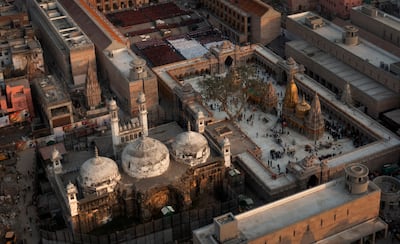An Indian court on Monday rejected a plea by a Muslim committee contesting a lawsuit filed by Hindus over claims that a historic mosque was a temple and asserting their right to worship inside the Islamic complex.
The 17th century Gyanvapi mosque in the Hindu holy city of Varanasi was built by Mughal ruler Aurangzeb allegedly over the ruins of an ancient Vishweshwar temple — dedicated to the Hindu god Shiva.
A group of Hindu women filed a lawsuit challenging the title of the mosque and demanding that they be allowed to pray inside the mosque, despite a law barring such petitions.

Varanasi's district judge AK Vishvesha ruled that the Hindu lawsuit was maintainable and allowed a further hearing on the lawsuit filed by Hindu petitioners seeking free access to the mosque complex for conducting religious rituals.
“Suit filed by Hindu worshippers maintainable,” the judge ordered.
The court fixed September 22 as the next date for hearing arguments in the appeal filed by the Hindu petitioners.
The petitioners — five Hindu women — have demanded free access to the complex and the right to pray to all “visible and invisible deities within the old temple complex”.
A popular 18th-century Kashi Vishwanath temple is close to the mosque.
Right-wing Hindu groups have campaigned for decades to reclaim the site, claiming that the Mughal ruler had demolished the temple to make way for the mosque.
The case was shifted from a civil judge to the district judge by the Supreme Court due to the “sensitivity and complexity” of the issue.
The top court also maintained its interim order of protecting the spot where the purported Shiv Linga — a representation of Lord Shiva — was found, while allowing Muslims to worship in the mosque for eight weeks or until the maintainability of the suit is decided.
The apex court’s intervention came while hearing a plea filed by the mosque committee challenging a court order for videography of the entire mosque complex and the sealing of a pond where a purported Shiv Linga was claimed to have been found.
The civil court in Varanasi had ordered the filming of the mosque, based on the petition.
A report of the filming at the mosque was then submitted to the Varanasi court in a sealed cover, but the Hindu petitioners controversially made the video and other details public just hours later.
A court commissioner who was earlier appointed to conduct the survey of the mosque was removed for leaking information to the media.
The top court then said that all issues would have to be first argued before the district court and adjourned the matter until October 20.
Security had been beefed up in the city and orders were imposed to avoid any communal tension on Monday, Santosh Kumar, a top city police officer, said.
Police forces, bomb squads and sniffer dogs were posted in areas with Hindu and Muslim populations.
Several Hindu groups including Vishwa Hindu Parishad, a radical group linked to powerful Hindu supremacist Rashtriya Swayamsevak Sangh (RSS), have unsuccessfully filed lawsuits to reclaim the mosque complex that is protected under India’s Places of Worship Act.
The legislation was passed to protect historical but contentious religious sites in the country and mandates that the nature of all places of worship are maintained as they were on the day India gained freedom from British rule in 1947.
There have been recurrent calls from Hindu right-wing parties to demolish the mosque, like the 14th century Babri Mosque that was razed by members of the ruling Bharatiya Janata Party (BJP) and the RSS in 1992.


